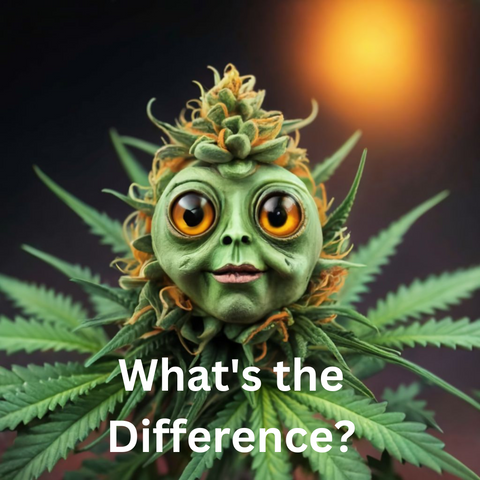THC is a compound in cannabis known for its mind-altering effects and possible medical benefits. Within the realm of THC, two distinct forms, thca vs delta 9 THC, hold significance due to their unique characteristics and implications. This blog aims to elucidate the dissimilarities between THC A and Delta 9 THC, their effects, potential benefits, federal legal status, methods of consumption, and other pertinent information.
Understanding THC: A Simple Introduction
THC, or tetrahydrocannabinol, is a cannabinoid present in the cannabis plant. It is responsible for the plant's psychoactive effects and is often associated with feelings of euphoria and relaxation. THC interacts with the body's endocannabinoid system, specifically the cannabinoid receptors, to produce its various effects.
THC A vs Delta 9: What's the Difference?
THC A and Delta 9 THC are two distinct forms of THC. THC A, or tetrahydrocannabinolic acid, is the acidic precursor of Delta 9 THC found in raw, unprocessed hemp plants.

It is non-intoxicating and does not produce the typical psychoactive effects associated with THC. On the other hand, Delta 9 THC is the primary psychoactive component of cannabis, responsible for the "high" that is often linked to cannabis consumption.
Effects of Delta 9 THC: Intoxicating and Potential Benefits
Delta 9 THC causes feelings of euphoria, relaxation, changes in perception, and increased appetite due to its intoxicating effects. These effects are primarily attributed to its interaction with the endocannabinoid system in the body. Delta 9 THC can help with pain relief, nausea, vomiting, and some medical conditions. It also has intoxicating effects.
Smoking, Vaping, and the Legal Status in the United States
Smoking and vaping are common methods of consuming THC products. It's important to be aware of the legal status of Delta 9 THC in the United States. While cannabis remains illegal at the federal level, several states have legalized its use for both medicinal and recreational purposes. Furthermore, the 2018 Farm Bill legalized the cultivation and sale of hemp-derived products, including those containing Delta 9 THC as long as they contain no more than 0.3% Delta 9 THC on a dry weight basis.
Potential Benefits and Side Effects
While Delta 9 THC has potential benefits, it can also have adverse effects. Some individuals may experience anxiety, paranoia, impaired memory, or an increased heart rate after consuming products high in Delta 9 THC. It's essential to consider these factors and consult a healthcare professional before using Delta 9 THC products, especially if you have a history of mental health issues or are pregnant or breastfeeding.
Unveiling the Power of Raw Cannabis: THCA Products vs. Delta-9 products
Delving into the world of raw cannabis to understand the differences between THC-A and Delta-9. Whether you're a seasoned connoisseur or new to the scene, grasping these compounds is essential for maximizing your cannabis experience.
When it comes to raw cannabis, we often hear about THC, the well-known psychoactive compound. But have you ever heard of THC-A? THC-A, or tetrahydrocannabinolic acid, is the non-psychoactive precursor to THC found in raw, unheated cannabis. This means that when you pluck a fresh bud from a cannabis plant, it doesn't contain THC – it contains THC-A. It's only when you apply heat a process called decarboxylation through smoking, vaping, or cooking that THC-A converts to the well-known Delta-9-THC, the compound responsible for the euphoric effects of cannabis.
Now, let's talk about THC-A products. With the rising popularity of cannabis products, you might have come across THC-A products that tout their potential health benefits. These products are made from raw cannabis that has been carefully processed to preserve the THC-A content. From tinctures and topicals to capsules and edibles, the market is brimming with innovative ways to incorporate THC-A into your wellness routine. Whether you're looking for a gentle introduction to the world of cannabis or seeking alternative therapeutic options, THC-A products derived from hemp and marijuana offer a unique approach to harnessing the plant's natural goodness.

Speaking of hemp and marijuana, it's important to note that both varieties of cannabis contain THC-A. However, hemp is legally defined as cannabis with extremely low levels of Delta-9-THC (0.3% or less), while marijuana typically contains higher levels of Delta-9-THC. This distinction plays a significant role in the types of products that can be derived from each plant. So, whether you're drawn to the versatility of hemp-derived CBD products or the full-spectrum goodness of marijuana-derived offerings, there's a world of raw cannabis waiting to be explored.
Raw cannabis is a treasure trove of potential, and understanding the nuances between THC-A and Delta-9 opens up a world of possibilities. Whether you're drawn to THC-A products for their wellness benefits or simply intrigued by the creative potential of raw cannabis, there's something for everyone in this vibrant and ever-evolving space. So go ahead, embrace the power of raw cannabis and let your journey be guided by the magic of THC-A and Delta-9.
Conclusion
In conclusion, understanding the differences between THC A and Delta 9 THC is crucial for making informed decisions about their consumption. While Delta 9 THC is known for its intoxicating effects and potential therapeutic benefits, THC A does not produce intoxication and is being researched for its own potential health benefits. It's important to be mindful of the legal status of these compounds in your area and to consider their potential effects on your health before using them.
In this blog, we have explored the dissimilarities between THC A and Delta 9 THC, their effects, potential benefits, legal status, methods of consumption, and other pertinent information. By gaining a better understanding of these two forms of THC, individuals can make informed choices regarding their use and navigate the evolving landscape of cannabis legislation and research.


